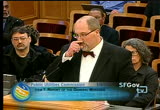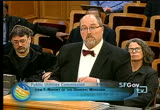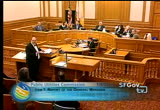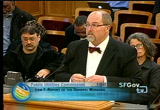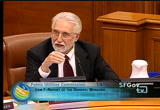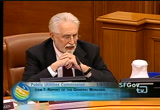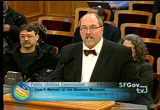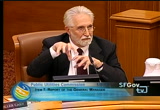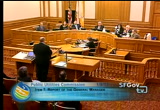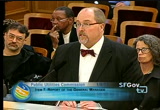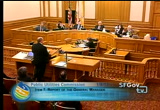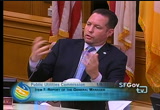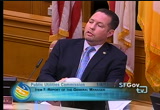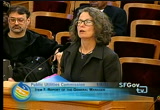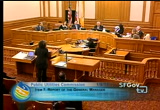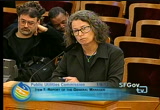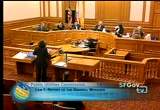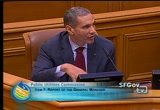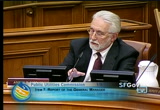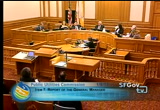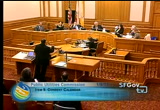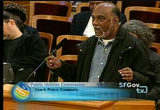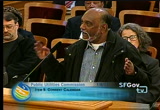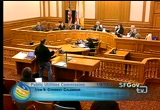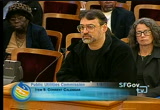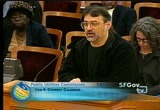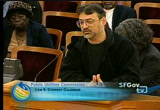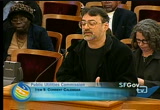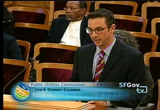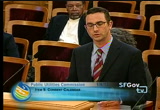tv [untitled] January 11, 2013 10:00am-10:30am PST
10:00 am
consumers. and the other big assumption i want to make sure -- i know you'll appreciate is that the model assumes a socialization of cost and benefits. and, so, unlike anything else you've done with rate setting where the state requires us to set costs and rates by class, so, commercial customers pay only what commercial customers should be paying and residential customers pay only what residential customers should be paying because of the costs are divvied up. this model assumes that all the cost savings are socialized and that those cost savings which are predominantly generated by commercial customers are shared with residential customers. so, it's not a good or bad policy, but it's just a very different policy than what we get than in the past. so, one of the questions that we have posed to the contractors and also to others who have been involved in the
10:01 am
stakeholder group is it's a very large assumption to assume that private property commercial owners would be willing to or would want to share their savings with residential customers because they could do many of the good things that are being proposed for energy efficiency and capture 100% of the savings for themselves or for their tenants. so, absent that, the model is hard to make the numbers work. >> and, so, one other assumption, too, i thought i saw in there was the ex-hetch hetchy power would be used. are we able to do that? i thought that would be able to be used for residential. >> at the appropriate time, yes, please answer the question. >> so, we have provided a ten-year history of where we have had surplus capacity for
10:02 am
hetchy power to the consultants. to the degree there is reliable surplus, we would look at an ability to try to make use of that. the concern is that we have noted and what i believe now a number of the participant, both the participants and stakeholders have, even though we have surplus, we typically only have surplus during certain months of the year when we have water flowing from the dam and create electricity. but then we have shortfalls during other times of the year. so, it's never even. and when we have surpluses, every other large hydro producer has surpluses, too. and that's when large hydro power is very cheap. so, we provided all the data and the key pieces that you'll be getting from them is a siting analysis which will really put -- where the rubber meets the road where we're going to fight local generation. >> commissioner moran and commissioner courtney. >> thank you, mr. president.
10:03 am
first of all, thank you for all of that reading material. [laughter] >> i was looking for things to do. and actually, i think your characterization of it was very helpful. it is a -- what's being proposed is a paradigm shift. that takes us perhaps out of our comfort zone, but that's what we need to look at. that's not a bad thing. it's just it is very good and very different. and the challenges of it, i what just beginning to appreciate as i was going through that. retail electrical generation puts me in mind if there were suggestions from time to time that instead of improving treatment at our water treatment plants, we should put water treatment facilities under every sink in the city. and it's somewhat similar to that. and the logistical demands of
10:04 am
how you do that in various -- not all sinks are the same. not all property owners are the same. how you service that with a work force that is limited the number of trucks. that sort of thing. it's a very different proposal and that's the kind of thing i think you're working out and i don't want to rush into that. i do have two questions, though, that came out of the reading. one is that the two proposals are quite different in nature. are we going to be asked to pick one or the other, or is there -- is this a phase a, phase b kind of thing? are they compatible? do you really have to choose one? that's my first question. the second question, i guess, is to the city attorney. there was a description of the status of people who opt out from cca offering. the description in the materials that the local power produce basically said that if
10:05 am
you opt out, you do not have another -- we do not have another opportunity to solicit them for an opt out in an opt out manner, but that they retain the ability to opt in at any time. and that i think is different than what i've heard before and i'd like a clarification of what the status is of somebody who is give not an opt-out opportunity and elects to opt-out and changes their mind. >> first question. >> so, on the first question, the way we wrote the contract was that this could help inform the phasing and the growth of the cca program. and, so, even in the recommendations from lpi, they have assumed that phase as you have approved it in concept, goes forward and the business layered on top. * phase 1. in our discussions with them and also with the advocates, in other words, we have always said we want to try to take the best ideas, even if they're just pieces of them. maybe it's not the whole enhi
10:06 am
lad a or the entire billion 5 -- >> i've so tired of hearing the whole enchilada. >> [speaker not understood]. >> so insulting. [laughter] >> go ahead. >> but the entire amount so that we could then bring the decision back to you to try to layer on what works and what is affordable for policy. >> is it a compatibility issue relevant to your response? that was the question. >> i guess i had heard from the applicants before. i know [speaker not understood] will speak at the conclusion of this. i heard the sense that they really didn't like the program that we're coming up with. they thought it was fatally flawed, we needed to do something different and they were coming up with a different proposal. and then deep in the recesses of what i was reading there were references to maybe it was okay to do a phase a program like we're suggesting but to limit it in size. and that's the first time i had
10:07 am
heard -- that i had heard that. i said before that's the first time i heard. so, that's the question. because it's very different from our speaker techtive. if we think we're proceeding, basically the question for the new material is when and if and how we implement it, but we're going to go ahead with phase a. that's one kind of decision. you have to choose between two very different approaches, that's a very different kind of decision for us to make. >> i think what i'm hearing is that his response to the question -- it is responsive to the question at least in what we have asked and our local power to do, the presumption has been there would be a phase a implementation as we have designed it with something else to follow. * >> is that a correct assessment? >> that is a correct assessment. but i think the central point that we have heard repeatedly from local power as well as the advocates, stakeholders is that in doing that, if you lead off with the rates that have a
10:08 am
premium cost, then you risk losing through opt-out customers which goes to your second point. and, so, absent, absent the city policy makers being able or willing to borrow over a billion dollars and have economies of scale and absent commercial property owners, private property owners being able to share the savings among the whole, the choice of doing this, this much larger project, i don't believe is yet practicable. ultimately that's a policy decision for you. >> [speaker not understood] before us is the review of a potential subsidy program. >> it would be cross-subsidyization of customers [speaker not understood]. >> congress has said the program for that on milk, nash car and other areas. you had a question about opt out. >> that was to the city
10:09 am
attorney as to what the status is of a person who has been offered an opt-out opportunity has chosen to opt-out. what are their options? * and the way it was described in the material, we had folks they would have the option of opting in, but that we would not have the option of offering them another opt-out. so, the question, is that correct? what is not correct? >> [speaker not understood], city attorney's office. unfortunately theresa muler is the expert on the community aggregation state legislation. so, i don't want to venture a guess at that answer. she'll be available at 3 o'clock and answer -- >> that's not an answer i need to have right now anyway, but it is one that is an important question. it's one that's been sort of hanging out there for a long time. i have never had an answer that i understood completely. i like this description. i can understand that. i just don't know if it's right. that's why i would like [inaudible]. >> commissioner courtney.
10:10 am
>> thank you, commissioner. thank you, todd, for your report. one of the conversations that we had at the last meeting was related to the community outreach and the map. we had a color coordinated map and we discussed a contract that was led out or reaching out into specific targeted communities of the program. i'm requesting that the commission be advised of the progress each and every time that we hear a report on clean power sf related to any progress that's made with respect to which individuals or which groups, if you will, are going to be saddled with those responsibilities. and the purpose behind that is to make sure that in each community where folks are less inclined to answer the doors or whatever it is, we need to be not only sensitive to that, but just know that that's an issue and make sure that before we make a mistake we get all the information here up front. * commissioner torres
10:11 am
secondly, when we were talking about this -- and i think we have to anticipate, you know, this is going to start to morph into a much bigger, more public conversation. we talk a lot about a build-out. we talk a lot about community work force and opportunities with respect to the construction components of the program. so, i hear that we're talking to contractors about various assignments. i'm going to ask that we shed some light on that, have conversations about exactly which contractors those are. earlier today we did have some representatives from a labor organization who had concerns with the contractor who wasn't a responsible contractor. whether we're talking about i think tensionally prohibiting community folks, local residents from entering into career path in the building trades by denying them apprenticeship opportunities or education opportunities, i
10:12 am
think we need to talk quickly about who is having those conversations and with whom they're having those conversations because i think it's something that's appropriate for us to talk about here. so, i'm asking for those two thing. >> all right. commissioner caen. >> are we restricted at all by the [speaker not understood] in terms of what and how we sell our electrical power? >> yes, we are. noreen wants to give the legal description. there are restrictions for public uses. >> [speaker not understood]. >> if i could jump in here. we are allowed to sell under the raker act our power to anyone directly. we could sell our power to -- for resale only to not 230er profit entities. so, for example, we can sell our power directly to any customer that's interested in
10:13 am
being our customer. * we cannot sell it to pg&e to then resell it because they are a for profit. we can sell it to mud or the department of water resources for their uses. * smud >> so, we can't sell it to, say, apple? >> we can sell it to apple because that would be a direct sale for their use. we can't sell it to an entity that's going to then resell it. if apple were going to resell it to their next door neighbor, no. but if they're going to consume it them self-as a retail customer, yes. >> okay. >> commissioner vietor. >> i had a question about [speaker not understood] maybe for barbara -- around the work that's going on and how it ties in with some of this local power work. because one of the assumptions, and i think it's a pretty significant assumption, is that the commercial buy-in, whatever we want to call it, the commercial -- the socialization question, but there is also the question of whether they're
10:14 am
really going to opt-in and become customers of cca. if they're part of the collection data process, [speaker not understood] whether it's in our color-coded areas or elsewhere, what the commercial appetite for the buy-in to cca? >> no, we had not envisioned surveying commercial customers at this time. we do have some commercial customers who have expressed an interest, which is why we highlighted the ability for them to say i'd like to come in, and then for us to go through the opt-out process for customers like that. we can consider further whether it's appropriate to include commercial customers in the first telephone survey. >> you know, it seems -- i don't know. i mean, it's so hard to say because it seems like there's a lot of assumptions that are built into the local power proposal, that being a key one. if we don't get some data up
10:15 am
front, kind of blows that assumption, invalidates or invalidates that assumption if that is a work absolution or substantive solution to work on. >> we can talk internally at the staff level and with our contractors about whether we should try to incorporate that sort of line of questioning into this -- the phone survey that's currently calendared or whether that's a separate customer group and separate kinds of questions we'd be asking them anyway in a phone conversation. we can come back to you. >> that would be great. if the local power program does president move forward or changes in some way, that would probably be useful for the success of the cca program city-wide clean power sf to know if commercial program is going to tap in at what level, to get a sense of that. >> okay. >> so, i just wanted to point out we're really trying to march with the original policy of trying to sell 30 megawatts. and, so, one of the things that working with the board of
10:16 am
supervisors, we are concerned that if pg&e offers something competitive, what would happen because we will still be on the hook with the shell contract. and, so, when we do the survey, if we want us to ask more questions so that we can get, you know, a better idea about the program, i think that's a good thing. the other thing is that maybe what we can do at the next meeting, the 22nd, maybe we should just focus on the local power proposal because if we choose to look and deviate from our approach, we need to know it at that time because we're amving, assuming that we're going to with this program with shell and not really focus on local generation. and if you want to include any parts on it, then we have to reevaluate the structure of the contract with shell and a whole bunch of other things. * so, maybe on the 22nd we could just spend that time to look at the local power proposal and
10:17 am
maybe just discuss, and based off of that you can give us some direction. >> which will be difficult to do. because everything is so volatile at this point. but at least we can get close to some sense of what the blueprint you're looking at. >> what would help on that is if there is a revision to our program that basically serves -- preserves the second phase option, if we can have a full discussion of everything that would be in phase, that would be a very long meeting. * if the change in our program would be to have it the 20 megawatt program instead of the 30, if it is to have a provision in the shell contract
10:18 am
that says you can substitute hetchy power, i think that's in there. if there are discrete things like that, i think that would be very helpful because my guess is that the train that's moving is an r program. the question we have to ask is does that train need to stop in order to deal with this other proposal or not? and what helped me figure that out is how much does it have to change? or is it a minor change to keep going and we can deal with phase 2 in its proper time. >> fair enough. >> okay. we need to be moving, the time factor. >> finish closing this up. >> i'll lose a quorum here. >> the last piece, too, on that i think would be quite helpful is if there is some intermediate -- if there's a three-phase project with this proposal being phase three of the complete build-out, the billion plus bond measure, the
10:19 am
300 sites, what have you, is there kind of an intermediate phase to get going on the build-out which we all want to get to to kind of deal with some of these things, what the timeline might be for that, you know. and maybe those go in a phased approach so that we're not assuming the entire risk that it sounds like we would be assuming with the full-blown program. >> okay. and also the legal issues regarding the contract with shell, whether we even have that flexibility. that's the other issue as well. all right. we're moving on to the citizens' advisory committee update. mr. jones? public comment, i'm sorry. commissioners, we, the public, i know people
10:20 am
throughout, stakeholders, [speaker not understood], but we the public in san francisco ought to know how much power we consume. we've got to know how much power pg&e can bring into our city using our transmission lines because we pay for them. most importantly, we have to have an idea about the 400 megawatts of power that we get from pittsburgh. nobody speaks about that. and how that contributes to the general consumption in this city and county of san francisco. so, we have some people here who think they know about energy issues and what they dole out to us is just their way of thinking. it's a very wrong mentality. now, when it came to that
10:21 am
survey the first time around, they did not treat us right. and thank god we had a couple of commissioners who spoke to the point and more or less brought it on track. it is simply wrong that if for 60 years the southeast sector was bombarded by dangerous particulates, lead, mercury by pg&e, that now when this city wants to take a holistic approach, we in the southeast sector are left out just because we happen to be poor. but do you think it's right for us to take the burden when all the garbage comes into our community, all the other treatment plants in our community, all the industrial plants in our community, that
10:22 am
the base polluted close to our community, that our watershed polluted, do you think that's right? i know y'all are distant, but stop. those that present have to be sensitive that in conducting the surveys, that we don't think that because we give a million or $2 million to some consultant that they are going to seek our better interest. but stop and think about our better interest. but i am here to tell you because they haven't sought a better interest, that you commissioners step up to the plate and do the right thing in the year 2013. thank you very much. >> i don't have a request. sometimes i write it down. [speaker not understood] representing san francisco green party and local grassroots organization in our city.
10:23 am
so, i've got to say that i've been sitting in the audience listening to the staff presentation experiencing a pretty high level of frustration. and i'm not going to get into all the details why. but what i would urge you to do is in that huge packet of materials that you've got, once you've gone through the concerns raised by the san francisco public utilities commission staff, please read all the responses from local power because we address the concerns. there are some of the things from local power that address concerns that mr. reedstrom raised today. they're addressed in the local power documents. there is a disconnect between the staff's understanding of what local power is proposing and what local power is proposing. and part of the disconnect is just that what local power is proposing is complex and it
10:24 am
takes a lot to get your head around it. on the specific questions, commissioner moran, yes, that is true. once a customer has an opportunity for an opt-out, you can't give them such other opportunity. they can only opt-in. what a lot of folks don't know is after that initial opt-out is over, the customer does not have the opportunity even to get into the clean power sf program for another 18 months, and a lot of people don't know that. that's very crucial, that we lose for 18 months even the pro-- slim possibility of an opt-in for the customers. how many customers opt out at the beginning of the program is crucial and that's why the build-out component is so important. on the issue of surveys, if we don't do what local power is proposing we're not going to have any data with which to dovetail that with local
10:25 am
power's proposal and integrate it with the program. so, yes, we need to do survey work that includes the whole package that local power is proposing including the rates they're proposing which are much lower than the rates being proposed by the straight shell program start-up. and also a potential opportunity for customers to share in ownership and benefits. and, so, the most important thing to say, though, is that it's really key -- and this is the answer to your primary question -- that what local power is designing, these build design specifically with the understanding that the shell contract is sort of sack row sirthctiontionv. it is what it is and we have to work with the shell contract. * sacrosynct the 1st. the huge power they are proposing does not obfuscate
10:26 am
the program in any way. [speaker not understood] the shell program doesn't have the opportunity to get very many riders or customers on it. or a train leaving the station that actually has a good probability that it will cost less money and will be an entire train hooked up to the engine instead of just a caboose. that's what this is about, is whether or not we're going to roll out the full train or just an engine and a caboose. and, so, and that brings me to the final note which is that i've got to correct some history here. that what local power is proposing is not a new or revolutionery or different proposal. it's the original proposal that was proposed in 2003 that was voted on in 2007 with an implementation plan, and that we are -- that advocates have specifically said year after year we are not letting you leave the train off of the [inaudible]. * this is just local power showing how to work this into
10:27 am
the shell contract so the original 1.3 billion, $1.4 billion program actually gets bidthvthv. so, please internalize that and read those documents and i look forward to the 22nd. thanks. >> mr. jones, your long awaited report. >> commissioners, mr. kelly, thank you. i have a quick report. it should be fairly light. first of all, i wanted to thank mr. courtney for asking the citizens advisory committee to weigh in on that outreach to non-english speaking communities. we did that in november and had -- we probably won't be providing a resolution or anything formal. we have the draft minutes, the
10:28 am
notes from our discussion that i think may be helpful, kind of the highlights. there were five points that were interesting. art jensen in the back of the room had my favorite. keep it simple. i think the bigger the [speaker not understood] the longer the message, the more difficult it is to translate to other languages. there is an existing sfpuc emergency response plan that is in multiple languages. the idea is maybe to draw on that as a blueprint of some sort as the outreach for the community choice aggregation communication happens. one of our members mentioned there is a department of education, the public's -- i think it's the public school has a newsletter that comes out in six or seven languages and that may be something good to draw on just as the main languages to look at. the idea from one of of our
10:29 am
members is if there is -- as the dialogue goes on, there should be a map that is continually updated about the input of the different languages that someone says from this neighborhood you need this language, just kind of a document that is an ongoing document that the puc may want to start working. if it doesn't exist already, build upon as the conversation keeps going. and we also had donald olivier from the department of environment come and talk a little bit about his organization's interest and some of the work they've done currently with the puc on helping with outreach. so, that is -- that was something that we did that was great. and the minutes, the draft minutes you have, it's also on the website. as far as our membership, we are currently at 15 of 17 members seated, and i would love to thank supervisor
73 Views
IN COLLECTIONS
SFGTV: San Francisco Government Television Television Archive
Television Archive  Television Archive News Search Service
Television Archive News Search Service 
Uploaded by TV Archive on

 Live Music Archive
Live Music Archive Librivox Free Audio
Librivox Free Audio Metropolitan Museum
Metropolitan Museum Cleveland Museum of Art
Cleveland Museum of Art Internet Arcade
Internet Arcade Console Living Room
Console Living Room Books to Borrow
Books to Borrow Open Library
Open Library TV News
TV News Understanding 9/11
Understanding 9/11